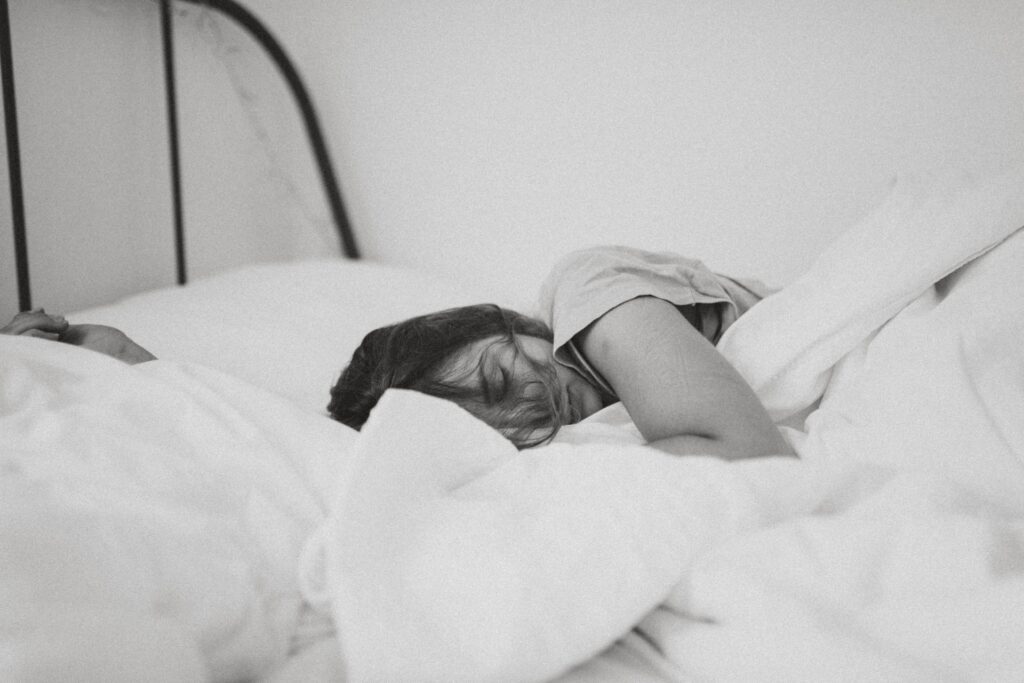Say Goodbye to Poor Sleep Hygiene: Tips for a Better Night’s Sleep
As an Amazon Associate, I earn from qualifying purchases.
Disclosure: Some of the links in this article may be affiliate links, which can provide compensation to me at no cost to you if you decide to purchase a paid plan. You can read our affiliate disclosure in our privacy policy.
Say Goodbye to Poor Sleep Hygiene: Tips for a Better Night’s Sleep
Hey there! Are you having trouble getting a good night’s sleep? Feeling groggy and unrefreshed even after sleeping for hours? You might be dealing with poor sleep hygiene, which means bad habits that keep you from snoozing well. But no need to stress, we’ve got your back! In this post, we’ll give you the lowdown on what poor sleep hygiene is, explain why it’s so important to practice good sleep habits, and offer some tips for catching some Zzzs. Plus, we’re going to talk about how age, gender, and personal differences can affect your sleep patterns. So, get ready to say goodbye to restless nights and hello to more rejuvenating sleep! Keep scrolling for all the deets.
Understanding Poor Sleep Hygiene
Getting a good night’s sleep is crucial for your wellbeing but did you know that your sleep hygiene habits can impact the quality of your rest and even your overall health? While consistent and relaxing bedtime routines, comfortable sleep environments, and stress-reducing techniques can all contribute to a peaceful slumber and better health, poor sleep hygiene habits like looking at screens late at night or inconsistent sleep schedules can lead to mood changes, fatigue, and even serious health conditions. Taking the time to adopt healthier habits and understanding the importance of good sleep hygiene can help you get the sleep you deserve and improve your overall wellbeing.
What is Poor Sleep Hygiene?
Have you ever had a night where you just can’t seem to fall asleep? Understanding poor sleep hygiene is key to getting a better night’s sleep. Poor sleep hygiene are those habits and behaviors that can mess with your ability to get quality sleep. It’s things like irregular sleep schedules, using electronics before bed, and sipping on caffeine or alcohol too close to bedtime. Not getting enough sleep leads to problems such as irritability, lack of concentration, and fatigue. But don’t fret, you can improve your sleep hygiene! Creating a relaxing bedtime routine, sticking to a regular sleep schedule, and limiting electronics before bed are great ways to start. These changes can make a huge difference in your overall well-being by improving your quality of sleep and leaving you feeling rested and ready to tackle the day.

The Effects of Poor Sleep Hygiene
Have you ever had a day where you felt constantly fatigued and unable to concentrate? It could be due to poor sleep hygiene. Not only can it affect your physical health, but it can also impact your mental wellbeing. Poor sleep habits can lead to a range of negative effects, including mood swings and even an increased risk of chronic diseases. Factors like irregular sleep schedules, too much screen time, caffeine intake, and a lack of exercise can all contribute to poor sleep hygiene. However, there are ways to improve your sleep quality. Creating a relaxing bedtime environment and establishing a consistent sleep routine are helpful steps to take. Also, managing stress, avoiding late-night snacking, and limiting caffeine and alcohol consumption can all make a big difference in getting a good night’s rest.
Why is Good Sleep Hygiene Important?
Getting a good night’s sleep is essential for a happy and healthy life. Poor sleep habits can lead to stress, fatigue, and decreased productivity. By sticking to consistent sleep patterns and practicing good sleep hygiene, such as avoiding caffeine and alcohol before bed and creating a relaxing environment, you can improve the quality of your sleep. Not only will this benefit your overall well-being, but it can also reduce the risk of health issues like obesity, diabetes, and heart disease. Sleep is crucial for allowing your body to repair and regenerate, so prioritize your sleep hygiene for a more fulfilling life.
Benefits of Good Sleep Hygiene
Want to feel like a superhero? Prioritize good sleep hygiene! Not only does it boost your immune system, but it can also enhance cognitive functions like memory and decision-making. Plus, imagine feeling energized and productive all day long. Creating good sleep habits is an investment in your physical and mental health, helping to reduce stress and anxiety and promote emotional stability. So catch those Z’s and feel like a boss!
Risks of Poor Sleep Hygiene
Are you feeling tired, groggy or lacking energy during the day? Poor sleep hygiene might be the culprit! This means that your sleeping habits may not be up to scratch, which can lead to some not-so-great side effects like obesity, diabetes and heart disease. Not to mention, it can also affect your brain, mood and overall wellbeing. But don’t worry, there are easy fixes! A regular sleep schedule and a calming bedtime environment can all help improve your sleep hygiene. No more counting sheep for you!
Tips for Practicing Good Sleep Hygiene
Want to wake up feeling refreshed every morning? Start by mastering the art of good sleep hygiene. That means establishing a regular sleep schedule, and sticking to it even on weekends. Wind down with a soothing bedtime routine, like taking a warm bath or reading a book – but ditch the screens! Blue light from electronic devices can mess with your circadian rhythm. And don’t forget to optimize your sleeping environment for quiet and comfort. A supportive mattress and cool room temperature can work wonders. Plus, limiting caffeine and alcohol before bed can help you snooze more soundly. Sweet dreams!
Establish a Consistent Sleep Schedule
If you’re finding it tough to catch some Z’s, creating a consistent sleep schedule might be the answer you’re looking for! A routine will help your body’s internal clock get into a groove, making it less of a struggle to drift off and rise with the sun. It’s important to stick to your schedule even on weekends to keep your body on track. And to really put your body in sleep mode, consider creating a relaxing bedtime routine. A hot bath or a good book can tell your body it’s time to hit the hay. Sweet dreams!
Create a Relaxing Bedtime Routine
Ready to get some peaceful zzz’s? One way to ensure a great night’s sleep is by creating your own personalized bedtime routine. Make it a habit to chill out with a soothing bubble bath, lose yourself in a page-turning book, or focus on relaxation with some deep breathing techniques. Your mind and body will thank you for the chill vibes as you drift off into a peaceful slumber.
Optimize Your Sleep Environment
Want to snooze like a pro? Here’s the secret: make your bedroom into a cozy, tranquil oasis! Dim the lights, get some earplugs, and craft your ideal sleep nest. You can also upgrade your bedding and mattress to ensure maximum snuggle potential. Follow these tips to wake up feeling refreshed and ready to tackle the day!
Limit Screen Time Before Bed
Here’s a tip – put down that phone! It turns out that the blue light from electronic screens can mess with your body’s built-in sleep clock. In fact, it’s best to avoid screens altogether for at least an hour before bedtime. So, cozy up with a book, take a relaxing bath, or just enjoy some quiet time before you hit the pillow. Your well-rested self will thank you in the morning!
Avoid Stimulants Before Bed
Want to get a good night’s sleep? Practicing good sleep hygiene is key, and avoiding stimulants before bed is a top tip. Sorry to break it to you, but caffeine, nicotine, and alcohol are all known to mess with your sleep. Caffeine is especially tricky – it can stay in your system for up to 5 hours! To wind down instead, try sipping on some herbal tea or warm milk before hitting the hay. Steer clear of nicotine and alcohol too – while a drink might make you feel sleepy, it can actually disrupt your sleep later on. By avoiding these stimulants, you can set yourself up for a night of sweet, uninterrupted dreams.

Exercise Regularly
One of the keys to improving your sleep hygiene is to prioritize regular exercise. By hitting at least 30 minutes of moderate activity per day, you’ll help your body establish a healthy sleep-wake cycle. Just be sure to avoid super strenuous exercise right before bed, as it can leave you too pumped up to drift off. Plus, aim to work out earlier in the day so that your body has plenty of time to relax and unwind before bedtime. And, if you can, get outside and move around in natural light to boost your body’s melatonin production and increase the quality of your sleep. With a little commitment to regular exercise, you’ll be well on your way to catching all the zzz’s you need to feel your best.
Manage Stress Before Bed
Tossing and turning all night can be a real sleep-sapper. Did you know that stress is one of the biggest culprits? That’s why it’s important to manage your stress levels before bedtime. You might want to try some soothing yoga, deep breathing exercises, or meditation as part of your nightly routine. These relaxation techniques can help still your mind and prepare you for a truly restful night’s sleep.
Seek Professional Help If Needed
No matter how hard we try, sometimes our sleep just won’t cooperate. Despite all the tips and tricks out there, poor sleep hygiene can sneak up on us and become a real pain. If you’re finding yourself constantly tossing and turning, it might be time to seek some professional help. Don’t worry, there’s no shame in admitting you need a little extra support. A healthcare provider can pinpoint what’s causing your sleep struggles and provide personalized recommendations for treatment. You might need medication, therapy, or some changes to your daily habits. With a little help, you can finally get the refreshing rest you’ve been craving. So don’t suffer in silence – millions of people worldwide deal with sleep issues, and there’s a solution out there for you too.
Is Good Sleep Hygiene the Same for Everyone?
Getting a good night’s sleep is crucial, but what works for one person might not work for another. If you’re looking to improve your sleep hygiene, there are a few things that are generally recommended. These include setting a consistent sleep schedule, winding down with a relaxing bedtime routine, and avoiding screens before hitting the hay. But don’t forget about the other factors that can influence your sleep, like diet, exercise, and stress. And if you’re still struggling to get quality shut-eye, it’s always a good idea to get some professional advice. The most important thing is to figure out what helps you personally achieve the best possible sleep.
Age and Sleep Hygiene
When it comes to getting a good night’s sleep, age matters. The sleep habits of kids and teenagers are not the same as those of adults, and the needs of older adults can be different again. That being said, there are some universal principles that can help anyone get the best rest possible. Consistency is key – whether you’re young or old, establishing a routine for bedtime and wake-up time can make a huge difference. To create an atmosphere that’s conducive to deep sleep, consider reducing noise and light levels. Sweet dreams!
Gender and Sleep Hygiene
Getting a good night’s rest is key for feeling refreshed and energized, but did you know that men and women can experience different sleep challenges? For women, drifting off and staying asleep can be a struggle, especially when hormonal changes come into play. On the flip side, men might find themselves snoring or suffering from sleep apnea. Thankfully, there’s good news: establishing healthy sleep habits can help both men and women catch some quality Z’s, no matter what their gender.
Individual Differences in Sleep Hygiene
Did you know that your sleep hygiene practices are unique to you? That’s right, age, gender, medical conditions, and personal preferences can all play a role in determining what kind of sleep routine you need. So, it’s important to figure out what works best for you. Whether it’s a consistent bedtime routine or a little more flexibility, it’s all about finding what promotes the best sleep. Keep in mind that other factors like diet, exercise, and light exposure can also affect your sleep hygiene.
Additional Resources for Improving Sleep Hygiene
Don’t worry, there are plenty of resources available to help you drift off into dreamland. Sleep tracking apps can help you identify areas for improvement, while relaxation techniques like meditation and soothing sounds create a peaceful atmosphere. And if you’re still tossing and turning, don’t hesitate to seek guidance from a sleep specialist or therapist. But don’t forget about the lifestyle changes that can also improve your slumber, such as exercise, diet, and caffeine intake. With these tools at your disposal, you’ll be snoozing soundly in no time.
Sleep Hygiene Tips for Shift Workers
As a shift worker, getting quality sleep can be a challenge, but it doesn’t have to be impossible. To improve your sleep hygiene, try creating a dark, peaceful sleeping environment to signal your body that it’s time to rest. Relaxation techniques and avoiding caffeine before bedtime can also help you fall asleep easier. Even on your days off, aim to stick to a regular sleep schedule to regulate your body’s internal clock. And don’t forget about light therapy, which involves exposure to bright light in the morning or darkness at night to help regulate sleep patterns. With these tips, you’ll be feeling rested and refreshed, even as a hard-working shift worker.
How to Overcome Insomnia
Insomnia – the frustrating sleep disorder that can leave you staring at the ceiling, tossing and turning for hours. But fear not! There are plenty of effective strategies you can use to combat it. Start with a regular sleep schedule, avoiding caffeine and alcohol before bed, and creating a peaceful bedtime routine. Your sleeping environment plays a big role, so make it comfy and cozy for a good night’s rest. And if these tips don’t do the trick, don’t hesitate to reach out to a healthcare professional. With the right support and guidance, you can say farewell to those sleepless nights and wake up feeling refreshed and ready to conquer the day!

The Benefits of Napping
It’s time to embrace the power of napping. Taking a short 20-30 minute nap has been proven to boost alertness, enhance mood, and sharpen cognitive performance – all without leaving you feeling groggy when you wake up. Plus, napping can even make up for lost sleep and improve overall sleep quality. By finding the right balance and listening to your body’s signals for rest, you can incorporate naps into your routine and reap the benefits for your health and wellbeing. So don’t let poor sleep hygiene bring you down – take a snooze and wake up feeling refreshed and energized!
The Connection between Sleep and Mental Health
Did you know that getting enough shuteye can do wonders for your mental health? It’s true! Research shows that people who don’t get enough restful sleep are at higher risk for anxiety and depression. But don’t worry, there are plenty of ways to improve the quality of your sleep. Try setting up a relaxing atmosphere in your bedroom and sticking to a consistent sleep routine. You can also try using white noise machines or aromatherapy to promote relaxation. And if you’re still struggling, don’t be afraid to seek out professional help or resources like therapy or medication.
Questions:
What are signs of poor sleep hygiene?
Poor sleep hygiene can lead to difficulty falling asleep, staying asleep, or feeling rested. Signs of poor sleep hygiene include irregular sleep patterns, using electronic devices before bed, and consuming caffeine or alcohol close to bedtime. Other signs may include a lack of physical activity, an uncomfortable sleeping environment, and stressful thoughts before bed.
Improving sleep hygiene can involve creating a relaxing bedtime routine, limiting screen time, and maintaining a consistent sleep schedule. By making these changes, you may be able to improve the quality and duration of your sleep, leading to better overall health and well-being.
How do you fix poor sleep hygiene?
To improve poor sleep hygiene, try sticking to a regular sleep schedule, even on weekends, to help regulate your body’s internal clock. Create a relaxing bedtime routine to wind down before sleep, such as taking a warm bath or reading a book.
Make sure your bedroom is cool, quiet, and comfortable for optimal rest. Avoid consuming caffeine and alcohol before bedtime and limit your use of electronics in the evening as they can interfere with sleep quality.
By implementing these strategies consistently, you can establish healthy sleep habits and improve the quality of your rest.
What is the 10 3 2 1 0 sleep rule?
The 10 3 2 1 0 sleep rule is a helpful method for improving sleep hygiene. To follow the rule, avoid consuming caffeine and alcohol ten hours before bedtime, refrain from eating large meals or engaging in strenuous exercise three hours before bedtime, and turn off electronic devices two hours before bedtime.
One hour before bed, relax with a calming activity like reading or taking a bath. Finally, make sure to avoid hitting the snooze button in the morning to ensure a restful night’s sleep. By following these steps, you can improve your sleep habits and wake up feeling refreshed each day.
Conclusion
Getting a good night’s sleep is essential for maintaining optimal health and well-being. However, sleep problems, such as trouble sleeping, sleep deprivation, and daytime sleepiness, are common issues that many people experience. Lack of sleep can lead to a variety of negative health outcomes, including high blood pressure, increased cortisol levels, and daytime fatigue.
One way to improve sleep health is to establish healthy habits and a consistent daily routine. This can include maintaining a comfortable bedroom temperature, using an eye mask to block out light, and avoiding the use of electronics, such as TV or mobile phones, before bedtime. For those who have a hard time falling asleep, sleep medicine may be recommended by a healthcare professional.
It is important to recognize that sleep is a public health issue, and promoting healthy sleep habits should be a priority. The Centers for Disease Control and Prevention (CDC) has identified sleeplessness as a significant public health concern, and recommends that individuals prioritize sleep as part of their overall health and well-being.
One key factor that influences sleep quality is the body clock, which regulates the sleep-wake cycle. This cycle is influenced by a variety of factors, including body temperature, and can be disrupted by factors such as smoking and caffeine consumption. Understanding these factors and making adjustments to promote better sleep can have a positive impact on overall health and well-being.
In conclusion, promoting healthy sleep habits is essential for maintaining optimal health and well-being. Factors such as body temperature, daily routine, and the use of electronic devices can all impact sleep quality. By establishing healthy habits and seeking medical advice when necessary, individuals can promote better sleep and improve their overall health.







